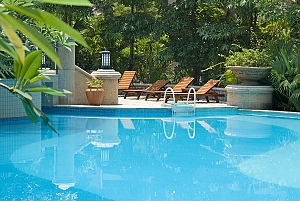Having a pool in your backyard can be a game-changer when it comes to outdoor living. Not only does it provide a refreshing escape from the summer heat, but it also creates a fun and relaxing space for family and friends to gather. With a lot of options available, it can be challenging to know where to start. When it comes to building a swimming pool, there are two main choices that homeowners can choose from: vinyl and concrete. Both of these materials have their advantages and disadvantages, and it’s important to weigh them carefully before making a decision on vinyl vs. concrete pools.
Difference In Vinyl vs. Concrete Pools
When it comes to choosing between a vinyl pool and a concrete pool, homeowners should know the differences in order to weigh their options. Ultimately, the decision between a vinyl pool and a concrete pool comes down to personal preferences and budget.
Materials

Vinyl pools consist of a flexible vinyl liner that is installed over a frame made of wood, steel, or polymer. This material is soft to the touch and provides a smooth, comfortable surface for swimmers. Vinyl is not prone to cracks or chips over time, making it a low-maintenance option that requires minimal upkeep.
Concrete pools are made of poured concrete that is reinforced with steel rebar, making them very durable over time. This creates a shell that is capable of withstanding the weight of the water and the pressure of the soil around it. After the shell is constructed, it is typically finished with a waterproof coating or tile to ensure that the pool remains leak-free. The result is a beautiful, long-lasting pool that can be customized to fit any shape or size.
Customization
Another significant difference between vinyl vs. concrete pools is the level of customization available. Concrete pools can be built in any shape or size, allowing for a high degree of customization. Vinyl pools still offer a range of design options to choose from.
Vinyl liners come in a variety of colors and patterns, allowing you to create a pool that perfectly matches your style and preferences. While the design options for vinyl pools may be more limited than those for concrete pools, many homeowners find that the range of choices available is more than enough to create a beautiful and unique outdoor space.
Vinyl vs. Concrete Pools Maintenance

Both vinyl and concrete pools require regular maintenance to keep them in good condition. Vinyl pools tend to be an easy overall maintain. The smooth surface of the vinyl liner makes it more resistant to algae growth and quite easy to clean. Concrete pools do require regular brushing to prevent algae buildup and may develop cracks or chips over time that need to be repaired.
Cost
The cost of a swimming pool is a major consideration for most homeowners. In general, vinyl pools are less expensive to install than concrete pools. However, the overall cost will depend on several factors, including the size, shape, and design of the pool.
Work With Masten Pools For Your Pool Installation
Both vinyl and concrete pools have their pros and cons. Ultimately, the decision will come down to your personal preferences and budget. Whatever your decision, be sure to work with an experienced pool builder who can help you choose the right materials and design for your needs.
Masten Pools has the knowledge and experience when it comes to pool construction, from design to installation to maintenance. With the right pool, you can create a beautiful and relaxing outdoor space that you’ll enjoy for years to come. Reach out today for a custom experience.
